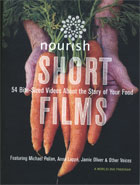
Nourish: 54 Bite-sized Videos About the Story of Your Food 2010
Distributed by WorldLink, The Presidio, 38 Keyes Avenue, Box 17, San Francisco, CA 94129 415-561-2141
Produced by WorldLink
Directed by various
DVD, color, 83 min.
Sr. High - General Adult
Food, Sustainability, Environmental Sciences, Health Sciences
Date Entered: 10/27/2011
Reviewed by Gary Handman, University of California BerkeleyThe title of this DVD is somewhat of a sneaky misnomer. These aren't really 54 self-contained short films at all; they're interviews with a handful of evangelists for the whole food/sustainable agriculture/healthy diet revolution chopped (minced?) into 54, public service announcement-sized sight/sound bites. (The case for the DVD bills it as "a companion to the award-winning PBS special Nourish: Food + Community).
And therein lies the problem.
I’m generally a big fan of short films, both features and docs. If handled effectively, it’s a form that requires the type of creative, highly disciplined story telling or documentary coverage that can be tremendously satisfying for the viewer. The short-form works best when it focuses incisively on a particular incident, event, or personality, or when it attempts to reveal small emotional, intellectual, or historical “truths.”
For obvious reasons, the form doesn’t work well at all for documentary subjects that demand complex or extended discourse or argumentation. The issues and problems dealt with in Nourish are nothing if not complex.
The talking heads featured in Nourish include an impressive roster of food luminaries, including the ubiquitous Michael Pollan (Omnivore's Dilemma, Penguin Press, 2006); Anna Lappé (Diet for a Hot Planet, Bloomsbury USA, 2010); loveably hyperkinetic TV chef Jaime Oliver; Alice Waters, doyen of New American Cuisine, as well as other impassioned and eloquent spokesfolk for responsible food production and consumption. And talk they do. Except for brief cut-away shots of fields and farms and marketplaces, we’re offered very little else than fractured rhetoric.
The filmlets, which roll on for a long 83 minutes, are organized around rubrics such as "Food & Biodiversity," "Food and Community,” "Sustainable Farming," "Animal Welfare," "Hunger and Obesity," and "My Food Journey."
The point of all of these can be summed up very briefly: whole foods=good; processed foods=bad. Home-cooked food=good; fast food=bad. Farmers markets=good; supermarkets=bad. Organic farming=good; industrial farming=bad. Pollan offers (yet again) his famous foodies’ koan, which also pretty much sums things up: “Eat food [i.e., whole food], not too much, mainly plants.”
This is not to say that the information and arguments contained in these films are not insightful or useful, or that I don't agree with them. (Hey, I live and work in Berkeley, after all—land of certified organic milk and sustainably harvested, free-trade honey). The problem is that the maddeningly atomized and attenuated nature of these discussions tends to reduce what's being said to nice-sounding slogans, buzzwords, and generalities which often come off as facile and under-cooked, or, worse, as annoying sophistry. To cite one example, Pollan talks (briefly, very, very briefly) about the average proportion of American income spent on food vs. health care in the 1960s and now. He informs us that since 60s, the percentage spent on food has decreased by half, and the amount spent on health care has increased precipitously (from 5% to 16%). The implication, of course, is that what we're eating is making us sick.
Unfortunately, the disproportionate increases in health care costs over the past forty years, and other contributory demographic or cultural factors aren't discussed at all—how could they in a 4 minute squib? One is left wishing for more protracted words from Pollan, a brilliant and fascinating guy who deserves to be heard unedited and at some length.
(Check out, for example Michael Pollan: The Omnivore's Dilemma on Youtube). On the other hand, I could have probably done altogether without Jamie Oliver telling me repeatedly how "brilliant" apples and herbs and dirt are.
Despite, or maybe because of, its Twitterish and peppy approach, Nourish might be a nice way to introduce kids to the issues surrounding healthy eating, or it could be a useful addition to public library collections.
For academic libraries, there are considerably better documentary choices available on the subject.